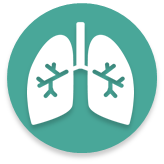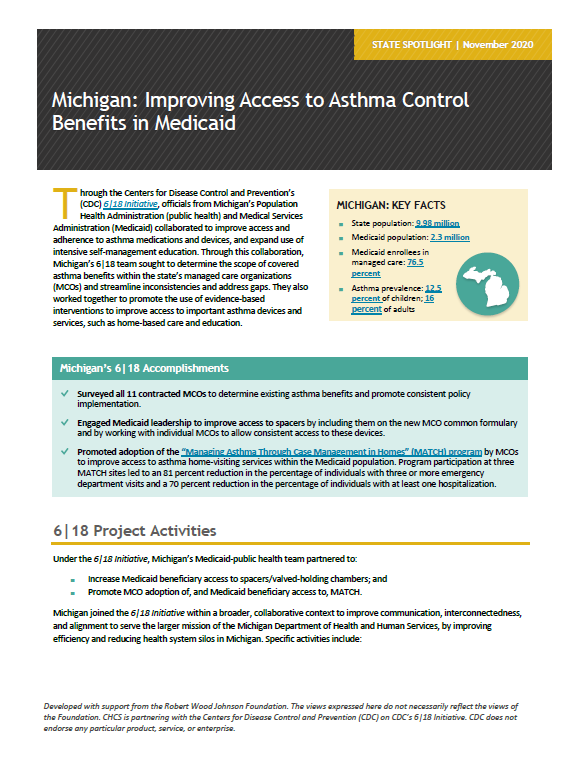Michigan: Improving Access to Asthma Control Benefits in Medicaid
December 2020 | 6|18 Initiative State Spotlight
Through the Centers for Disease Control and Prevention’s (CDC) 6|18 Initiative, officials from Michigan’s Population Health Administration (public health) and Medical Services Administration (Medicaid) collaborated to improve access and adherence to asthma medications and devices, and expand use of intensive self-management education. Through this collaboration, Michigan’s 6|18 team sought to determine the scope of covered asthma benefits within the state’s managed care organizations (MCOs) and streamline inconsistencies and address gaps. They also worked together to promote the use of evidence-based interventions to improve access to important asthma devices and services, such as home-based care and education.
MICHIGAN KEY FACTS
- State population: 9.98 million
- Medicaid population: 2.3 million
- Medicaid enrollees in managed care: 76.5 percent
- Asthma prevalence: 12.5 percent of children; 16 percent of adults
Michigan’s 6|18 Accomplishments
- Surveyed all 11 contracted MCOs to determine existing asthma benefits and promote consistent policy implementation.
- Engaged Medicaid leadership to improve access to spacers by including them on the new MCO common formulary and by working with individual MCOs to allow consistent access to these devices.
- Promoted adoption of the “Managing Asthma Through Case Management in Homes” (MATCH) program by MCOs to improve access to asthma home visiting services within the Medicaid population. Program participation at three MATCH sites led to an 81 percent reduction in the percentage of individuals with three or more emergency department visits and a 70 percent reduction in the percentage of individuals with at least one hospitalization.
6|18 Project Activities
Under the 6|18 Initiative, Michigan’s Medicaid-public health team partnered to:
- Increase Medicaid beneficiary access to spacers/valved-holding chambers; and
- Promote MCO adoption of, and Medicaid beneficiary access to, MATCH.
Michigan joined the 6|18 Initiative within a broader, collaborative context to improve communication, interconnectedness, and alignment to serve the larger mission of the Michigan Department of Health and Human Services by improving efficiency and reducing health system silos in Michigan. Specific activities include:
 1. Surveying All MCO Asthma Benefits
1. Surveying All MCO Asthma Benefits
Michigan’s Medicaid-public health team designed and coordinated a survey to determine the scope of the asthma benefits and how Michigan’s MCOs implemented the benefits to gauge if there were inconsistencies or problems. At the time, Medicaid was working on implementing a common formulary across all contracted MCOs. Michigan’s Medicaid-public health team developed the survey as a follow-up to the annual American Lung Association survey that tracks medication, device, and education initiatives and policies. All 11 contracted MCOs responded to the asthma benefits survey. If the team found implementation inconsistencies in an MCO’s response, Medicaid followed up with them to discuss the issues identified.
The Medicaid-public health team learned that, although spacers were already part of the defined pharmacy benefit and the durable medical equipment benefit, MCOs were implementing the benefit policy in different ways. As a result of the collaboration, all the MCOs agreed to interpret the spacer policy in a consistent manner, including access at the pharmacy, and spacers were included on the common formulary. Such consistency streamlines the benefit package, which is now less confusing for providers, pharmacies, and patients, and reduces barriers to and improves use of the Medicaid asthma benefits.
 2. Making the Case for Michigan’s MATCH Program
2. Making the Case for Michigan’s MATCH Program
Medicaid requires that each MCO meet case management requirements as part of their health promotion activities. However, MCOs have significant latitude around their population goals and how they plan to achieve them. Through the 6|18 Initiative, public health learned about the range of programs used by MCOS to meet these requirements.
Due to the MATCH program’s strong evidence base, public health wanted to encourage MCOs to adopt and use the program. MATCH provides home-based asthma case management for children and adults, predominantly from low-income families, who suffer from moderate to severe asthma. Michigan’s public health and Medicaid agencies collaborated to promote evidence-based interventions like MATCH to contracted MCOs. Medicaid included information on the MATCH program in different asthma-related materials, such as fact sheets, and included questions about MATCH on surveys. Medicaid also invited public health to present MATCH program data and information to MCO quality directors and care manager directors during one of their standing bimonthly operational meetings with contracted MCOs.
State Spotlights: Medicaid-Public Health Collaboration in CDC’s 6|18 Initiative
This profile is part of a series, developed by the Center for Health Care Strategies and made possible by the Robert Wood Johnson Foundation, that showcases how state Medicaid and public health departments are using the Centers for Disease Control and Prevention’s (CDC) 6|18 Initiative to accelerate the adoption of evidence-based prevention efforts focused on improving health outcomes and controlling health care costs. The CDC’s 6|18 Initiative links proven prevention activities to health coverage and delivery with a focus on six high-burden, high-cost health conditions — tobacco use, high blood pressure, inappropriate antibiotic use, asthma, unintended pregnancies, and diabetes.
